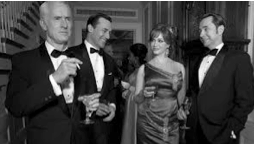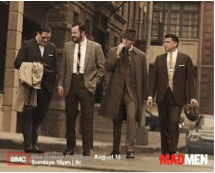Mad Men is one of the few television programs, outside of the work-based reality programs, that takes employment and business seriously. Many of the storylines center on the business activities of Sterling Cooper Draper Price (SCDP), the advertising agency in New York at which Don Draper, Roger Sterling and the other main characters are employed.
The 1960s in which Mad Men is set was a different job market than the present in California and the United States. The California unemployment rate was below 5% throughout 1968, going down to 4.1% in December 1968. Our aerospace, banking, shipping and retail trade giants dominated their industries in the 1960s, and were able to offer the stable employment more widespread in the 1950s and 1960s California.
 Yet, if the job market has changed, Mad Men of the 1960s (in season 6, we’re up to 1968) has lessons for employment that are relevant today. Chief among these lessons are the following three:
Yet, if the job market has changed, Mad Men of the 1960s (in season 6, we’re up to 1968) has lessons for employment that are relevant today. Chief among these lessons are the following three:
1. Get in the door; mobility is possible: Peggy Olson is the best example of getting in the door and advancing. She starts as Don’s secretary and moves up to copywriter, before moving to a rival advertising agency as Creative Director. Michael Ginsberg is hired as a part-time copywriter on the Mohawk Air Line account, and by showing writing ability advances to a full time copywriter position. Harry Crane starts as a media buyer and advances to Head of Media.
Is mobility less common today than in the 1960s? No. Job mobility within a firm and within an industry is still very common, at all levels, and in all sectors. The technology sector in California, in particular, is not structured around college degrees or graduate degrees, but rather around skills and experience. For California job seekers this mobility underlines the importance of getting in the door, even if it is not a position that one ultimately wants to end up in.
2. Continue to refresh skills and learn new skills: Roger Sterling appears to be finished professionally with the loss of his main client, Lucky Strike. However, though over 50 by 1967, he comes back with aggressive marketing strategies, including in 1968 helping the firm to land a major automobile account. Bert Cooper founded the agency with Roger’s father in 1923, but in 1968, he is still active, if behind the scenes. Bert adapts to change, as the firm takes various corporate forms and as it expand its product line to airlines and automobiles.
In today’s job world, being able to adapt to change is more important than ever. This adaptation can mean trying new strategies within a field. It can also mean learning new skills, even retraining in new careers. California has for some time had an extensive retraining system of community colleges, private vocational schools and California state universities. In the past few years this system has been joined by an even greater system of online retraining, with such training sites as Encore Career Institute and Udacity.
3. Don’t be complacent, no matter what you’ve done in the past: There are a number of instances in which workers are laid off for no fault of their own– particularly Sal, after he refuses the advances of Lee Garner Jr. of Lucky Strike. Others are laid off, though, after they become complacent, or are unable to overcome personal battles with alcoholism. Duck Phillips is Director of Accounts at Sterling Cooper (predecessor of SCDP) and for a time president of Sterling Cooper; but he is fired when he drunkenly attacks Don after Don says he’s leaving the firm. Freddy Rumsen, longtime copywriter, is fired from Sterling Cooper after he is drunk and falls asleep before a Samsonite presentation.
In today’s job market, it’s even more the case that being at a firm or in profession for some years does not guarantee continued employment. “Coffee is for closers”, as we are told in Glengarry Glen Ross. No matter what you’ve done in the past, you’re only employed as long as you are adding value to the company or not embarrassing the company.
Mad Men reminds us not to romanticize the job world of the 1960s. Unemployment, layoffs, firings were present even then. They are even more common today. Popular culture can instruct us in many fields, and Mad Men has lessons for navigating the job world of 2013.



